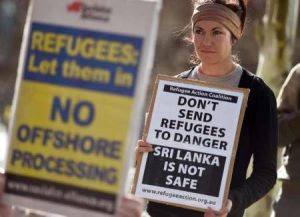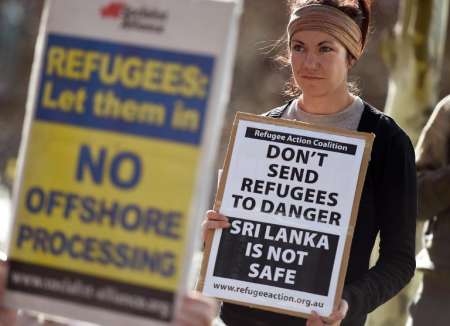Sri Lanka Today: Affidavit by Jake Lynch
“The situation in Sri Lanka today poses grave risks
to human rights and human security.
[…]
To return asylum seekers to these conditions
is to expose them to grave risk of ill-treatment and death.”
By Associate Professor Jake Lynch
Director, Centre for Peace and Conflict Studies, The University of Sydney
July 7, 2014
The situation in Sri Lanka today poses grave risks to human rights and human security. While no longer in a state of full-blown war, the country can only in a very limited sense be described as being ‘at peace’.
The 2012 US State Department Human Rights Report on Sri Lanka includes reports of serious human rights violations, including unlawful killings by security forces and government-allied paramilitary groups.
“[…] security forces appear bent on exerting oppressive domination
over large tracts of territory, claiming land for military bases
and implementing emergency measures.
They routinely resort to arbitrary detention, torture and abuse of
those they suspect of involvement in the Tamil Tigers”

In February 2013, the monitoring group, Human Rights Watch, released a report titled ‘We Will Teach You a Lesson: Sexual Violence Against Tamils by Sri Lankan Security Forces’, which presented evidence of 75 sexual assaults over the period 2006-2012.
In May 2014, two months ago, a Bill submitted to the US House of Representatives Committee on Foreign Affairs noted that the Sri Lankan government’s Lessons Learned and Reconciliation Commission was intended to pave the way for a return to normal life after the civil war, but that ‘very few of its recommendations have been successfully implemented’.
In particular, the Bill noted, ‘large numbers of persons have not received restitution for land that remains part of government high security zones’ and ‘the continued military presence on private lands is preventing the full resettlement of internally displaced persons who desire a return to peaceful life’.
There are well-attested allegations that the Sri Lankan government is trying to stifle dissent on these matters within Sri Lanka. The Jaffna Press Club complained to the Ministry of Defence after the Sri Lankan military shut down a meeting of journalists in May 2014 at Girithale, in Polonnaruwa, organised by Transparency International and titled, ‘Investigative Reporting on the Enforcement of the Recommendations made by the LLRC’.
Overall, the situation in Sri Lanka today carries multiple dangers to human rights and human security. Authorities in the country have blocked any meaningful progress towards a political settlement of legitimate grievances that underpinned the 25-year civil war, including some of the steps recommended by the LLRC, which the government itself set up, but which it has since disavowed.
Instead, security forces appear bent on exerting oppressive domination over large tracts of territory, claiming land for military bases and implementing emergency measures. They routinely resort to arbitrary detention, torture and abuse of those they suspect of involvement in the Tamil Tigers, and use the coercive power of the state to curtail investigation of their activities.
The US House of Representatives Bill now under consideration by the Foreign Affairs Committee (H Res 587 of the 2d Session, 113th Congress) refers to:
‘The removal of the country’s chief justice, decreasing space for dissent, continued militarization throughout the country, and intimidation of journalists and critics of the government [which] have created a sense of impunity and creeping authoritarianism within Sri Lanka’.
The background is one in which no satisfactory progress has been made in the investigation of alleged war crimes, during the civil war, or towards bringing perpetrators to justice. This was the explicit rationale for the UN Human Rights Council’s decision, at its meeting in March, to set up an independent investigation of these matters under the UN High Commissioner for Human Rights, Judge Navanethem Pillay.
Then there are the recent rounds (in the last three weeks) of anti-Muslim violence, in the town of Aluthgama, southwestern Sri Lanka, which have seen Sinhala Buddhist mobs burning and looting Muslim-owned shops and businesses. Journalists from international news organisations, quoting local sources, have reported the police doing nothing to stop them.
Sri Lanka today is a country in which many people may have well-founded fears of persecution. The well-documented abuses that give rise to these fears are of active current concern to the United Nations Human Rights Council; the US House of Representatives Foreign Affairs Committee; well-respected international monitoring groups such as Human Rights Watch, and many others. To return asylum seekers to these conditions is to expose them to grave risk of ill-treatment and death.


